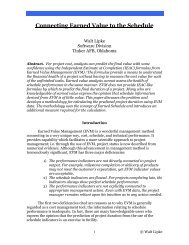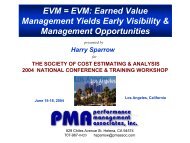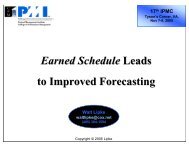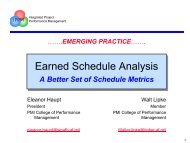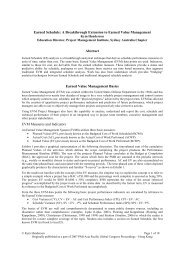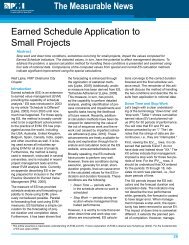Earned Schedule Training
Earned Schedule Training
Earned Schedule Training
You also want an ePaper? Increase the reach of your titles
YUMPU automatically turns print PDFs into web optimized ePapers that Google loves.
2 My Experience Summarised<br />
• <strong>Schedule</strong> Performance Indicators (for early and late finish projects):<br />
• SPI(t) & SV(t) do portray the real schedule performance<br />
in agreement with [1] [2]<br />
• Forecasting Duration (for early and late finish projects):<br />
• at early & middle project stage: pre-ES & ES forecasts produce<br />
similar results<br />
• at late project stage: ES forecasts outperform all pre-ES<br />
forecasts in agreement with [2] [3]<br />
• Assessing Project Duration (for early and late finish projects):<br />
• the use of the SPI(t) in conjunction with the TCSPI(t) has been<br />
demonstrated to be useful to manage the schedule expectations<br />
application of [3]<br />
[1] Lipke Walt, <strong>Schedule</strong> is Different, The Measurable News, Summer 2003<br />
[2] Henderson Kym, <strong>Earned</strong> <strong>Schedule</strong>: A Breakthrough Extension to <strong>Earned</strong> Value Theory? ? A<br />
Retrospective Analysis of Real Project Data,The Measurable News, Summer 2003<br />
[3] Henderson, Kym, Further Development in <strong>Earned</strong> <strong>Schedule</strong>,The Measurable News, Spring<br />
2004<br />
IIPMC 2005 Fall Conference Rev.2<br />
π Stephan Vandevoorde



